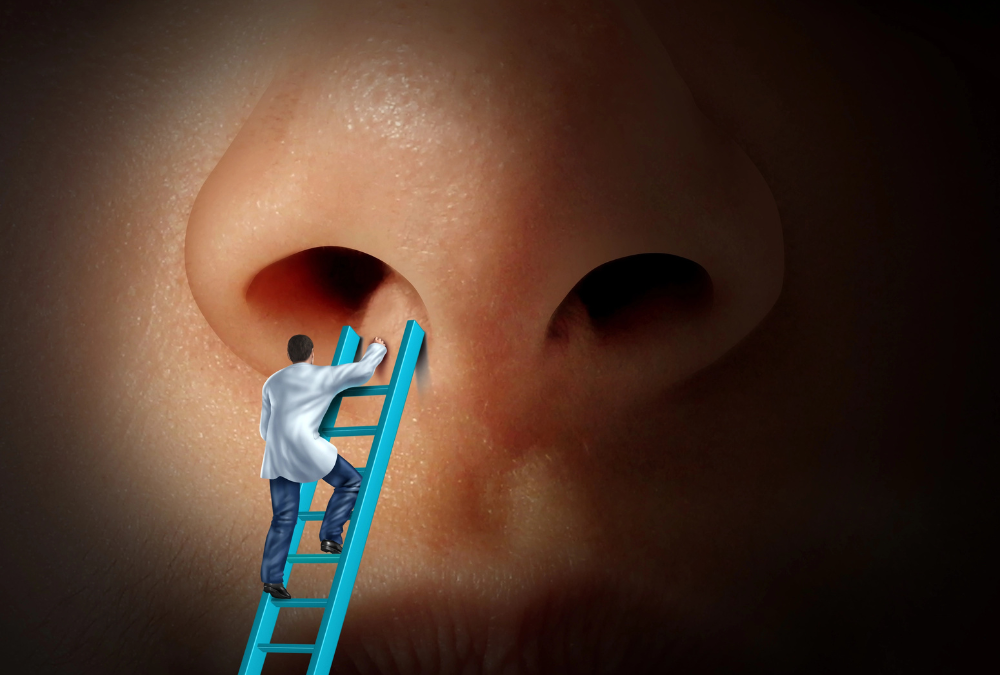
Is VivAer Treatment Right for You?
Nasal congestion and labored breathing are frustrating conditions that affect countless people. Nasal airway obstruction is a common condition that can significantly affect your quality of life. Fortunately, there are treatments available! One innovative option is VivAer treatment, a minimally invasive procedure designed to reshape your nasal passages for improved airflow. But how do you know if VivAer is the right solution for you?
Understanding VivAer Treatment
VivAer is a cutting-edge treatment that addresses chronic nasal obstruction, often caused by structural issues within the nose. The root of nasal airway obstruction can lie in the nasal valve, a small area inside your nose where the septum (the wall dividing your nostrils) and the sidewalls of your nose meet. Issues like enlarged turbinates (structures inside the nose) or a deviated septum can narrow this space, making it difficult to breathe.
During the VivAer treatment, an ENT specialist in Orange County (ear, nose, and throat doctor) uses a specially designed handpiece with a thin wand. This device delivers low-temperature radiofrequency energy to gently reshape the soft tissues and cartilage within the nasal valve area. This targeted reshaping widens the nasal airway, leading to improved airflow for easier breathing.
VivAer stands out from other nasal obstruction treatments due to its minimally invasive nature and focus on addressing the structural causes of congestion. Unlike traditional surgeries that often involve cutting or removing tissue, VivAer uses gentle remodeling. This leads to a less disruptive procedure, minimal discomfort, and a significantly shorter recovery time. It offers a potentially long-lasting solution without the need for incisions or extensive downtime.
Importantly, VivAer treatment can be comfortably performed in the office of an ENT specialist near you under local anesthesia. This means you won’t need the extensive preparation and recovery associated with a hospital setting. After the quick procedure, you should be able to return to most of your normal daily activities within a short time frame.
Assessing Candidates for VivAer Treatment
If you experience the below, VivAer treatment might be a great option. Consult with an ENT specialist in Orange County to explore whether it’s right for you.
- Chronic nasal congestion: Persistent stuffiness and difficulty breathing through your nose, making everyday life uncomfortable.
- Difficulty breathing during exercise: Shortness of breath or the need to breathe through your mouth when active, limiting your workouts or enjoyment of physical activities.
- Unsuccessful prior treatments: If medications, nasal strips, or other remedies haven’t provided adequate relief, VivAer treatment might offer the solution you’re seeking.
If any of these situations sound familiar, it’s time to consult an “ENT specialist near me”. An in-depth evaluation is essential to determine if you’re a good candidate for VivAer treatment. Your ENT specialist in Orange County will start with a comprehensive consultation to discuss your medical history, the severity of your symptoms, and your overall health.
Next, they will likely perform a thorough physical examination of your nose. Sometimes, diagnostic tests may be ordered to get a clearer picture of any structural issues contributing to your nasal obstruction. These tests could include imaging scans or nasal airflow studies.
After gathering all the information, your doctor will work with you to determine if VivAer aligns with your individual needs and treatment goals. This collaborative approach ensures the best chance of success on your journey toward easier breathing!
Pros and Cons of VivAer Treatment
Like any medical procedure, VivAer treatment offers both advantages and some important considerations. Understanding these fully will help you make an informed decision.
Advantages of VivAer
- Minimally invasive: Unlike traditional nasal surgeries, VivAer involves no incisions or tissue removal. This means less discomfort and a much quicker recovery period.
- Improved nasal airflow: VivAer’s targeted reshaping of the nasal passages has the potential to significantly improve your breathing, leading to an enhanced quality of life.
- Quick recovery: The minimally invasive nature of the procedure means most people can return to their usual activities within a few days.
- Long-lasting results: While individual experiences may vary, studies have shown that the benefits of VivAer treatment can last for years, offering sustained relief from chronic congestion.
Considerations and Limitations
- Possible side effects: While generally well-tolerated, some people may experience temporary discomfort, swelling, or minor bleeding in the days following the procedure. These side effects are usually mild and resolve on their own.
- Variable effectiveness: As with most medical treatments, individual results with VivAer can vary. Your ENT specialist in Orange County can offer personalized guidance on the likelihood of significant improvement based on your specific case.
- Cost and insurance: The cost of VivAer treatment can vary, and your insurance coverage may influence your out-of-pocket expenses. It’s essential to discuss the financial aspects with both your ENT specialist’s office and your insurance provider.
Lifestyle Impact and Expectations
Potential improvements in quality of life
VivAer treatment aims to significantly reduce nasal congestion, making everyday life easier. As your ability to breathe through your nose improves, exercise might become more enjoyable and productive. Reducing reliance on medications can be a significant benefit, minimizing potential side effects and improving overall well-being. Many people report feeling less self-conscious about their breathing and experiencing a boost in overall confidence.
Realistic expectations for outcomes
It’s essential to remember that VivAer treatment, like any medical procedure, doesn’t offer a guaranteed cure for everyone. Individual results can vary. Your ENT specialist in Orange County can provide the most accurate prediction of likely outcomes based on your specific case. Expect gradual improvement as your nasal tissues heal and remodel following the procedure. Full results might take a few weeks to become evident. While many people experience long-lasting benefits, the exact duration can vary. Some individuals might require occasional touch-up treatments in the future.
Post-treatment care and follow-up
VivAer recovery is generally quick, with most people returning to normal activities within a few days. You might experience temporary nasal congestion, minor discomfort, or mild swelling. Your ENT specialist will provide instructions for managing these expected side effects. Following your doctor’s post-treatment care guidelines will maximize healing and optimize your outcome. A follow-up appointment with your ENT specialist in Orange County is typically scheduled to assess your progress and address any concerns. Continued communication with your doctor ensures long-term monitoring and adjustments to your treatment plan if needed.
Alternative Treatment Options
Comparison with other nasal obstruction treatments
- Medications: Nasal sprays, decongestants, and antihistamines offer temporary relief but don’t address underlying structural issues and may have side effects with long-term use.
- Surgical procedures: Traditional surgeries like septoplasty or turbinate reduction might be necessary for severe cases but often involve more extensive tissue removal and longer recovery times.
- Non-invasive therapies: Devices like nasal dilators or breathing strips provide some mechanical improvement but might not offer adequate or long-term relief.
Factors influencing treatment choice
- Severity of obstruction: The extent of your nasal blockage helps determine the most appropriate treatment approach.
- Underlying cause: Whether your congestion is due to allergies, structural abnormalities, or other factors will influence treatment options.
- Personal preferences: Consider your comfort level with invasive procedures, potential side effects, desired recovery time, and cost considerations.
- Prior treatment experience: If you’ve tried other treatments with limited success, this information helps your ENT specialist in Orange County, like Orange Coast ENT Head and Neck Surgery, to customize recommendations.
- Overall health: Your general health status and any existing medical conditions will be factored into treatment decisions.
Making an Informed Decision
Choosing the right nasal obstruction treatment is a personal decision that requires careful consideration and a thorough discussion with a qualified healthcare professional.
- Do your research: Start by learning about the different nasal obstruction treatments available, including VivAer treatment, medications, surgical options, and non-invasive therapies. Reputable online sources can provide reliable information, but always consult with an ENT specialist in Orange County for the most accurate and up-to-date guidance.
- Consult with an ENT specialist in Orange County: Schedule a thorough evaluation with an ENT specialist near you. They can pinpoint the cause of your nasal obstruction, discuss treatment options in detail, and answer all of your questions.
- Discuss risks, benefits, and expectations: Each treatment approach has its own potential benefits, risks, and realistic expectations for outcomes. Have an open conversation with your ENT specialist, understanding that what works well for one person might not be the optimal solution for another.
- Consider your preferences and priorities: Think about your comfort level with different treatment options, desired recovery time, and individual concerns like cost or insurance coverage. Your ENT specialist can personalize their recommendations based on your input.
Your Partner in Better Breathing
Your healthcare provider is your best resource for personalized guidance and support on your journey to clearer breathing. Don’t hesitate to ask questions, express any concerns, and be an active participant in the decision-making process.
Conclusion
VivAer treatment offers a promising solution for those struggling with chronic nasal congestion. If you’re tired of feeling stuffy and want to explore a minimally invasive option, it may be worth investigating further. By consulting with a qualified ENT specialist in Orange County, you can determine if VivAer treatment is the right choice to help you breathe easier and live better.
Don’t let nasal congestion control your life! If you’re in the Orange County area and seeking relief, contact the expert team at Orange Coast ENT Head and Neck Surgery. Schedule a consultation to explore VivAer and other treatment options for your individual needs.






 Rhinoplasty:
Rhinoplasty: